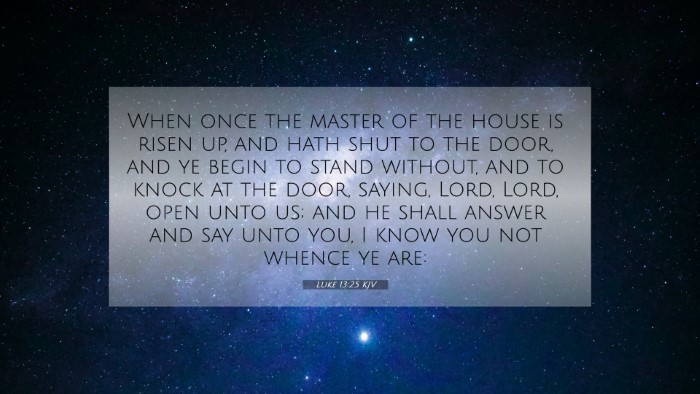Bible Verse Interpretation: Luke 13:25
Luke 13:25 states: "When once the master of the house has risen up and shut the door, and you begin to stand outside and knock at the door, saying, ‘Lord, Lord, open for us,’ and he will answer and say to you, ‘I do not know you, where you are from.’" This verse serves as a solemn warning about the finality of rejection and the importance of being prepared for the coming judgment.
Meaning and Themes
The parable emphasizes several important themes:
- The finality of God's decision: Once the door is shut, it symbolizes the closing of opportunity for salvation.
- The danger of false assurance: The individuals believe they have a relationship with the master, which is an illustration of those who incorrectly assume their status before God.
- The urgency of being prepared: This verse urges believers to ensure a genuine relationship with God, rather than relying on superficial claims.
Commentary Insights
From the commentary of Matthew Henry, we understand that the context of this passage highlights both the inclusivity and exclusivity of salvation. Henry stresses that while many might hope for acceptance, it is vital to truly know the master.
Albert Barnes adds that the imagery of knocking signifies desperation and pleading for mercy when it is too late. He underscores the notion that the master’s refusal to recognize them speaks volumes about their lack of authentic relationship.
According to Adam Clarke, this verse serves as a wake-up call to the community, addressing those who think they can casually approach God without the necessary repentance and faith. Clarke elaborates on the need for a personal acknowledgment of Jesus as Lord.
Cross-References for Luke 13:25
To deepen your understanding, consider the following cross-references that relate to the themes of Luke 13:25:
- Matthew 7:21-23: “Not everyone who says to me, ‘Lord, Lord,’ will enter the kingdom of heaven…”
- Revelation 3:20: “Behold, I stand at the door and knock…” illustrating Christ's desire for fellowship.
- Matthew 25:10-12: The parable of the ten virgins, focusing on being ready when the bridegroom comes.
- Hebrews 9:27: “It is appointed for men to die once, but after this the judgment,” affirming the urgency of preparedness.
- Luke 12:46-48: The parable of the wise servant emphasizes accountability and the consequences of neglect.
- John 10:14: “I am the good shepherd; I know my sheep and am known by my own,” which relates to the knowledge of God.
- Matthew 22:11-13: The guest without a wedding garment is cast out, reinforcing the necessity of being fit for the kingdom.
- Romans 14:10-12: “For we shall all stand before the judgment seat of Christ,” highlighting personal accountability.
- Luke 19:26: “For I say to you, that to everyone who has will be given, and from him who does not have, even what he seems to have will be taken away,” indicating the value of genuine faith gifts.
- James 4:8: “Draw near to God and He will draw near to you,” emphasizing the need for an authentic relationship.
Conclusions
Luke 13:25 serves as a pivotal reminder of the necessity for believers to maintain a true and living relationship with Christ, as signified by the accountability of knowing Him. The thematic connections made through cross-references enrich our understanding of the broader Biblical narrative that warns against complacency and the false assurance of salvation.
Applications for Study
To thoroughly understand and apply the lessons from Luke 13:25, consider:
- Engaging in cross-reference Bible study to explore parallel verses and themes.
- Utilizing a Bible concordance to find related topics and deepen your study sessions.
- Joining a cross-reference Bible study group for a comprehensive discussion on these themes.
- Researching the historical context surrounding this verse for richer comprehension.
- Implementing a systematic approach to cross-referencing Bible texts during personal devotionals.
In conclusion, Jesus' warning in Luke 13:25 is relevant today, urging believers to seek a genuine, relational authenticity with their faith. By studying and cross-referencing, we can deepen our understanding of Scripture and our personal walk with God.













